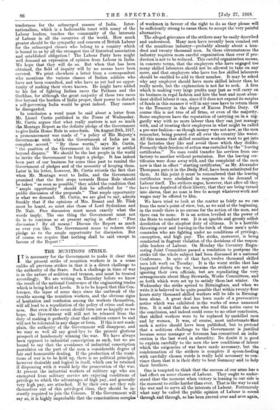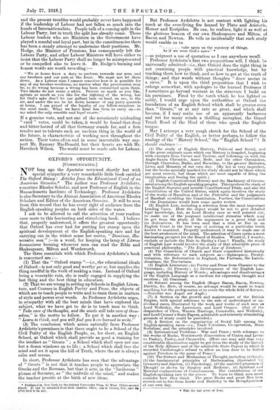THE MUNITIONS STRIKE.
I T is necessary for the Government to make it clear that the present strike of munition workers is in a sense unlike all previous strikes in that it is a direct challenge to the authority of the State. Such a challenge in time of war is in the nature of sedition and treason, and must be treated accordingly. We are writing on Thursday before we know the result of the national Conference of the engineering trades which is being held at Leeds. It is to be hoped that this Con- ference, the lapse of some days since the outbreak of the trouble among the munition workers, and the obvious signs of hesitation and. confusion among the workers themselves, will all lead to a repudiation of the policy of crime and mad- ness. But even if the event should turn out as happily as we hope, the Government will still not be released from the duty of making it perfectly clear that sedition cannot be and will not be tolerated in any shape or form. If this is not made plain, the authority of the Government will disappear, and we may as well all say good-bye to the present glorious prospect of handsomely winning the war. We have always been opposed to industrial conscription as such, but we are bound to say that the avoidance of industrial conscription postulates on the part of the men a considerable degree of fair and honourable dealing. If the production of the muni- tions of war is to be held up, there is no political principle, however desirable and logical in itself, which can be retained if dispensing with it would help the prosecution of the war. At present the industrial workers of military age who are exempted from military service are enjoying conditions of privilege to which the advantages of high pay, and generally very high pay, are attached. If by their own act they rule themselves out of this privileged class, they should be in- stantly required to join the Colours. If the Government will say so, it is highly improbable that the conscientious scruples of workmen in favour of the right to do as they please will be sufficiently strong to cause them to accept the very painful alternative.
The alleged grievance of the strikers may be easily described and understood. Many men have recently been combed out of the munitions industry—probably already about a hun- dred and twenty thousand men. In these circumstances the industry requires more careful organization than ever if pro- duction is not to be reduced. This careful organization means, in concrete terms, that the employers who have engaged too many skilled labourers should not be allowed to take on any more, and that employers who have too few skilled labourers should be enabled to add to their number. It may be asked why any employer should have more skilled labour than he really needs, but the explanation is not far to seek. A firm which is making very large profits may just as well carry on its business in regal fashion and hire the best and most abun- dant skilled labour it can, since if it does not expend its surplus of funds in this manner it will in any case have to return them to the Treasury in the shape of Excess Profits Duty. Of course this is not true of all firms, or even of the majority. Some employers have the reputation of carrying on in a nig- gardly way with no more labour than they can just manage with, and of treating their employees in what might be called a pre-war fashion—as though money were not now, as the men remember, being poured out all over the country like water. All this means that skilled munition workers want to get into the factories they like and avoid those which they dislike. Formerly their freedom of action was curtailed by the " leaving certificates." No man could transfer his services from one factory to another without permission. But the leaving cer- tificates were done away with, and the complaint of the men now is that in effect "starting certificates,' as Mr. Alexander Thompson puts it in the Daily Maid, have been substituted for them. At this point it must be remembered that the leaving certificates were abolished in response to the demand of Labour itself. The strikers argue, however, that after all they have been deprived of their liberty, that they are being turned into slaves, that no man is free to accept whatever work and wages may be offered to him.
We have tried to look at the matter as fairly as we can from the men's point of view, but, as we said at the beginning, in the result there is no excuse for the action of the men, and there can be none. It is an action levelled at the power of the State to conduct war. It is an ignoble and grossly selfish dereliction of the simplest duty of citizens. It is a horrible throwing-over and leaving-in-the-lurch of these men's noble comrades who are fighting under no conditions of privilege, exemption, and high pay. The strike, moreover, is being conducted in flagrant violation of the decisions of the respon- sible leaders of Labour. On Monday the Coventry Engin- eering Joint Committee passed a resolution to postpone the strike till the whole subject had been discussed at a national Conference. In spite of that fact, twelve thousand skilled men left work on Tuesday. It is the worst strike that has happened during the war, becanee the strikers are not only ignoring their own officials, but are repudiating the very arrangements about Shop Stewards, Works Committees, and so forth which were set up to satisfy them last winter. On Wednesday the strike spread to Birmingham, and when we write it is believed to be quite possible that within twenty-four hours sixty thousand skilled workers will be idle in Birming- ham alone. A great deal has been made of a provocative notice which was exhibited in the works of some unnamed firm. It is said that the men who read this notice came to the conclusion, and indeed could. come to no other conclusion, that skilled workers were to be replaced by unskilled men and by women. It was, of course most unfortunate that such a notice should have been published, but to pretend that a seditious challenge to the Government is justified because some manager or foreman has committed an indis- cretion is the last word in absurdity. No doubt it is good to explain carefully to the men the new conditions of labour which the exigencies of war have made necessary, but the condemnation of the strikers is complete if spoon-feeding with carefully chosen words is really held necessary to con- vince them that it is their duty to beat Germany and to help their brothers.
One is tempted to think that the success of our arms has a bad effect on some classes of Labour. They ought to under- stand that the moment when victory is leaning to our side is the moment to strike harder than ever. That is the way to end the war,and to serve all the interests of Labour. Fortunately what may be called the public opinion of Labour is sound through and through, as has been proved over and over again, and the present troubles would probably never have happened if the leadership of Labour had not -fallen so much into the hands of Internationalists. People talk of a coming split in the Labour Party, but in truth the split has already come. Those Labour leaders who are Ministers in the Government have played a manful and loyal part, but in the constituencies there has been a steady attempt to undermine their positions. Mr. Hodge, the Minister of Pensions, has consequently left the Labour Party, and other Labour Ministers will have either to insist that the Labour Party shall no longer be misrepresented or be compelled also to leave it. Mr. lodge's burning and honest words are worth recording :— "We at home have a duty to perform towards our sons and our brothers and our pals at the front. We must not let them down. As a Labour man I cannot conceive how it is possible for any of my brother-workmen, no matter what the provocation may be, to do wrong because a wrong has been committed upon them. Two blacks do not make a white. Protest as much as you like, agitate as much as you like for the righting of the wrong, but for God's sake don't let our gallant lads on land, on sea, in the air, and under the sea be let down because of any petty quarrels at home. I am proud of the loyalty of my fellow-members in the steel trade. What we have done has been to carry on—to my mind the only sensible and loyal course."
If a genuine vote, and not one of the notoriously misleading " card " votes, could be taken, it would be found that deep and bitter hatred of all that Germany stands for, and a firm resolve not to tolerate such an unclean thing in the world of the future, is characteristic of working men throughout the nation. Their votes of ten and in some inscrutable way, sup- port Mr. Ramsay MacDonald, but their hearts are with Mr. Havelock Wilson. The world must be made safe for Labour.



































 Previous page
Previous page